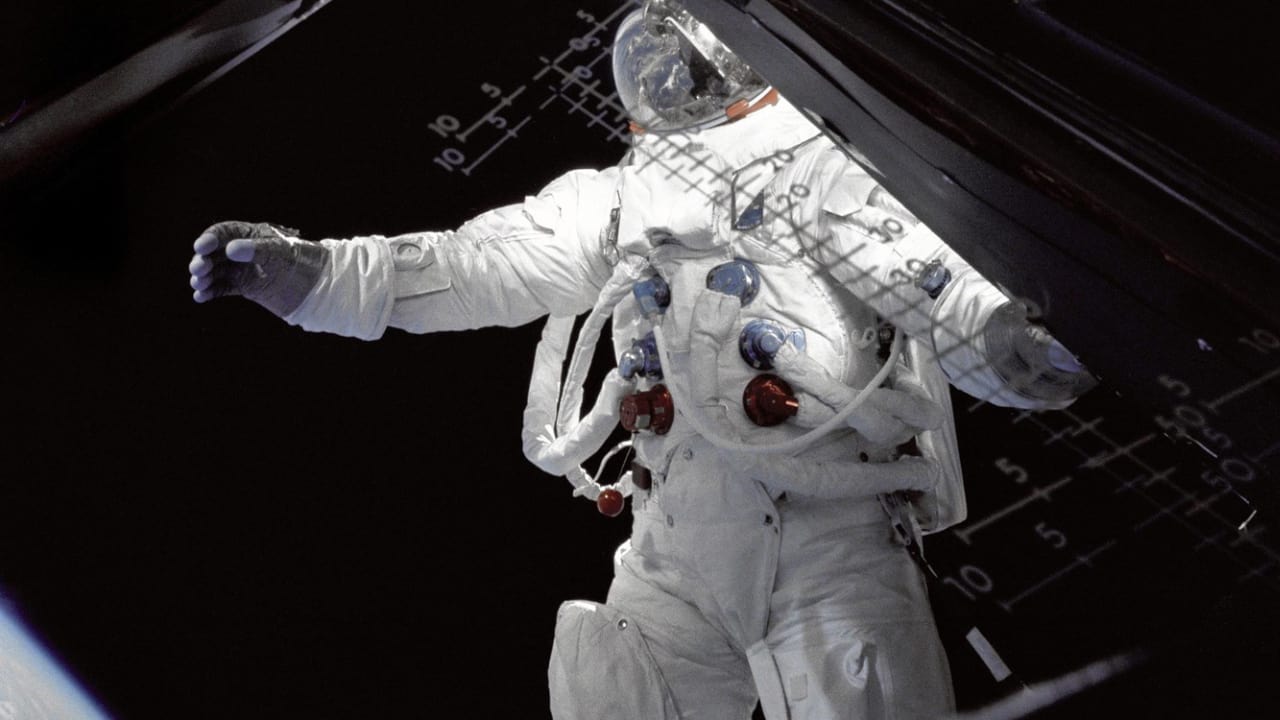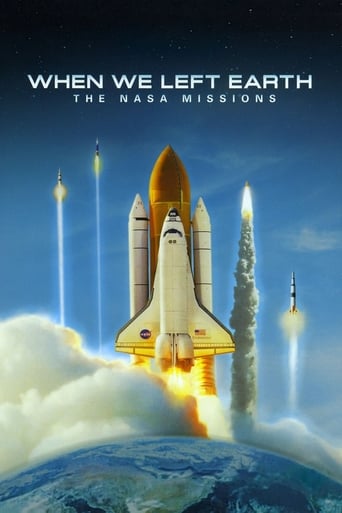SunnyHello
Nice effects though.
Contentar
Best movie of this year hands down!
Plustown
A lot of perfectly good film show their cards early, establish a unique premise and let the audience explore a topic at a leisurely pace, without much in terms of surprise. this film is not one of those films.
Micah Lloyd
Excellent characters with emotional depth. My wife, daughter and granddaughter all enjoyed it...and me, too! Very good movie! You won't be disappointed.
josey007
Overall, I thought "When We Left Earth" was a fantastic, excellent and amazing mini-series that I would be delighted to own on Blu-Ray DVD, if it weren't for those Swedish buccaneers. Nevertheless, the inclusion of so much color-footage shot by the astronauts themselves was clever and made for breathtaking viewing, and that's the selling point that will probably get me to fork out for the gen. discs. It wasn't all peaches- and-cream, however, and I was genuinely disappointed with the cursory treatment given to Apollo 1, which only received approximately four minutes of very bland, formulaic coverage. There was no imagery from any of the three Apollo 1 crew-members' funerals or memorials or anything heroic, and I believe the producers dropped the ball and missed the chance to jerk a bit of genuine contrived emotion out of us. Their decision not to was difficult to accept and is the only sore point for me in an otherwise-excellent miniseries.If it was the case that there simply was no video footage available from the funeral and interment of Gus Grissom, for example, my apologies. But if ever there was an appropriate forum in which to display such coverage/footage, it would've been here.
logos1
As a certified space geek, I'm not sure how I missed this when it first aired, but I just finished watching the whole series on Netflix and was very impressed.This series broke some ground that other similar documentaries have not. With respect to Apollo, perhaps the most novel thing was that they got Neil Armstrong to contribute commentary which he has steadfastly refused to do for any of the other documentaries such as "In the Shadow of the Moon" or "The Wonder of it All". The astronaut commentary in general was excellent. The examination of Mercury was far better than, say, The Right Stuff. The focus on the vital role that Gemini played in the development of the capability to land on the moon was also very welcome. I enjoyed hearing from astronauts like Jim McDivitt, who was actually more highly regarded than Armstrong in his class, who have been absent from similar documentaries. It was good to hear from Frank Borman and Bill Anders as well as they, too, have been absent for the most part. The tip of the cap to Skylab was good, too. Both Pete Conrad and Alan Bean have said they were more proud of their work on Skylab than on Apollo 12 where they walked on the moon.The coverage of the later years was excellent as well. Some nice work on the development of the Shuttle. Good summaries and insight into both the Challenger and Columbia tragedies. I had forgotten what a scandal the initial Hubble deployment was and how much effort it took to fix it (and how much was on the line with the repair). People have questioned the omission of Apollo 15 and David Scott from coverage and the commentary. I wondered about that as well and missed it as it was one of my favorite missions and, as others have said, was the first use of the rover. Those who posited that it had to do with the stamp scandal may be right. However,aside from NASA's collective memory being long, it may also have been a case that the Discovery Channel simply wasn't willing to pay him enough (or anything) for his appearance and he refused. That would be in keeping with the portrayal of him in Deke Slayton's autobiography. Some people have really been rough on the music for the series written by Richard Blair-Oliphant. I actually liked the music and thought it set a good background for most of the story. To each his own, I suppose.On balance, though, an excellent piece of work and a good orientation for anybody who would like an overview of NASA's manned space flight history. It's a shame that that history has come to a halt.
nikishopping
I thoroughly enjoyed watching this series. Unlike many shows on space exploration in which the focus is on space itself, this series was presented with an emphasis on the people who were involved to make it happen. Viewers are treated to personal behind-the-scenes trials and tribulations of space program from the perspective of the people who were there. Personal anecdotes and experiences are interspersed throughout the series. I often found myself saying, "Oh, I didn't know that." For example, describing what Allen Shepperd said to Mission Control before his first take-off was amusing.This is an American show produced from the American perspective. Sorry to break it to some people but contrary to worldwide belief, America is NOT the world's country. When America says "We" it doesn't mean Russia, Canada, Europe, China, and Japan too. America is entitled to tell its own history without having to include everyone else's too. Russia is welcome to produce its own space program documentary. And when they do, I don't expect it to include shots of Cape Canaveral or soundbites from John Glenn.
litefantastic
Every story has two halves: the material, and the way the teller tells it. In this case, though the end product was impressive, the Discovery Channel oversold this production to a point that bordered on inadvertent desecration. The storytelling itself was, all in all, very good (the fact that all the viewers know the ending is something that really couldn't be helped). However, I think the emphasis the Discovery people placed on the program's HD nature was silly. Most of the footage consists of either grainy, spotty film, or first generation video telefeeds that are so primitive I found myself impressed that they could work at all. The people of Earth were awed to see the twitchy, flickering image of Neil Armstrong on the moon in 1969. The "HD" billing the program got is something I can only attribute to the consumer zeitgeist of modern America.The second (and worse) mistake the Discovery Channel made was to air ads for the miniseries DURING the series BEFORE it had ended. I can't say why, but that really %*&&ed me off. Maybe it's just because I'd like to really bathe in the majesty of human existence for just a MOMENT without someone using it as a tool to sell me something. Yes, it's very nice that the single greatest artifact of human effort is now available on DVD and Blu-Ray at a discounted price. Get stuffed.And yet, marketing flaws aside, it really is an awesome story, and the people who made it did it well. I really was, as I had been promised, shown things I'd never seen before. I watched Richard Nixon talk to Niel Armstrong. I watched men use hardware supplies to innovate their way out of carbon dioxide poisoning. I watched the Challenger and the Columbia come down in chunks. I watched the Earth rise up from beyond the horizon of the Moon.I'm still amazed that this was all so recent that the principle characters are still alive, and to hear them talk was to feel the power. Niel Armstrong and Buzz Aldrin and the first President Bush and scores more spoke into the cameras of what they had seen, or done, or helped with. I actually realized that "the Establishment," as our rigidly organized government and its projects are often cynically called, was capable of miracles of its own.Bon voyage.

